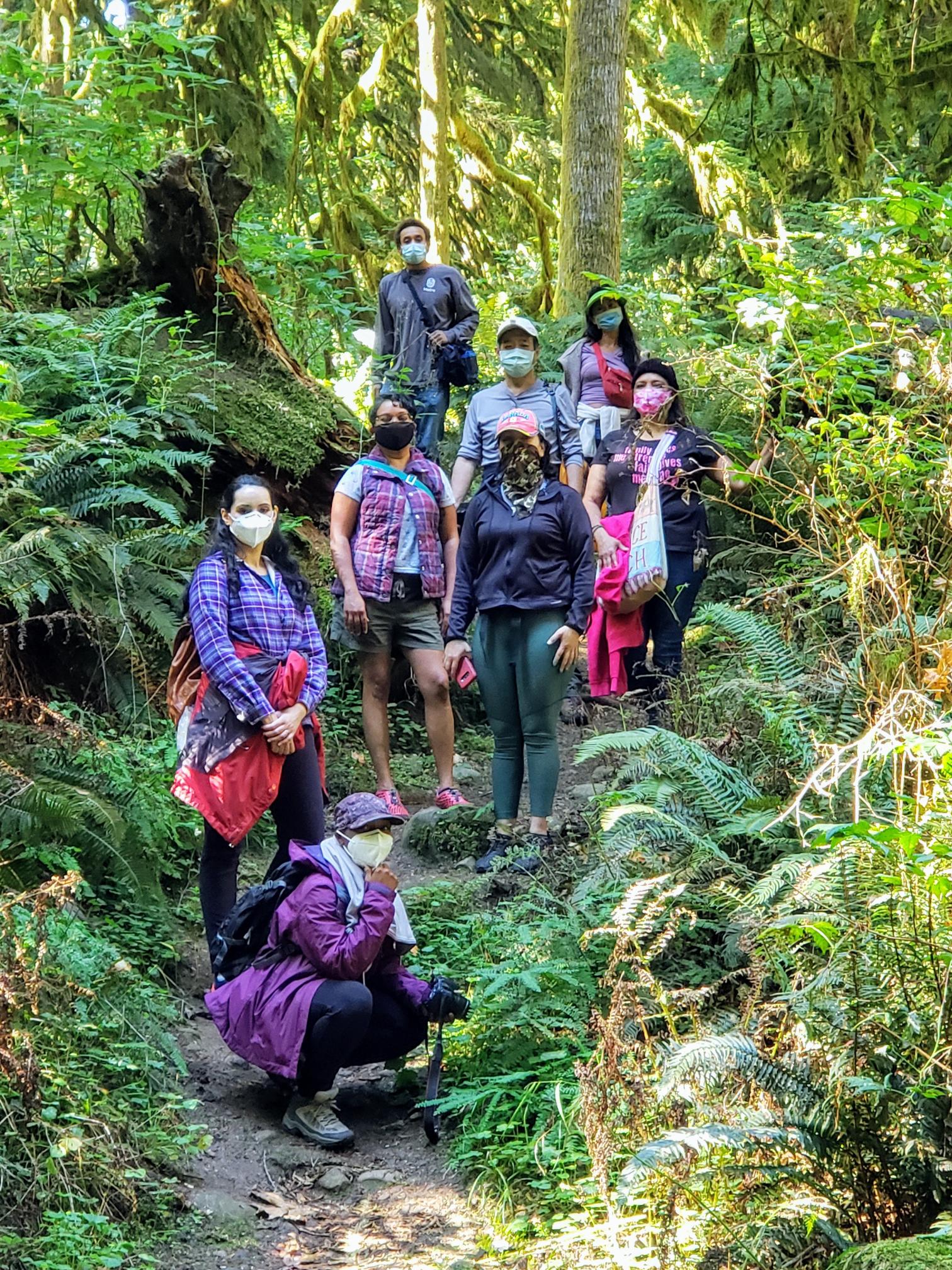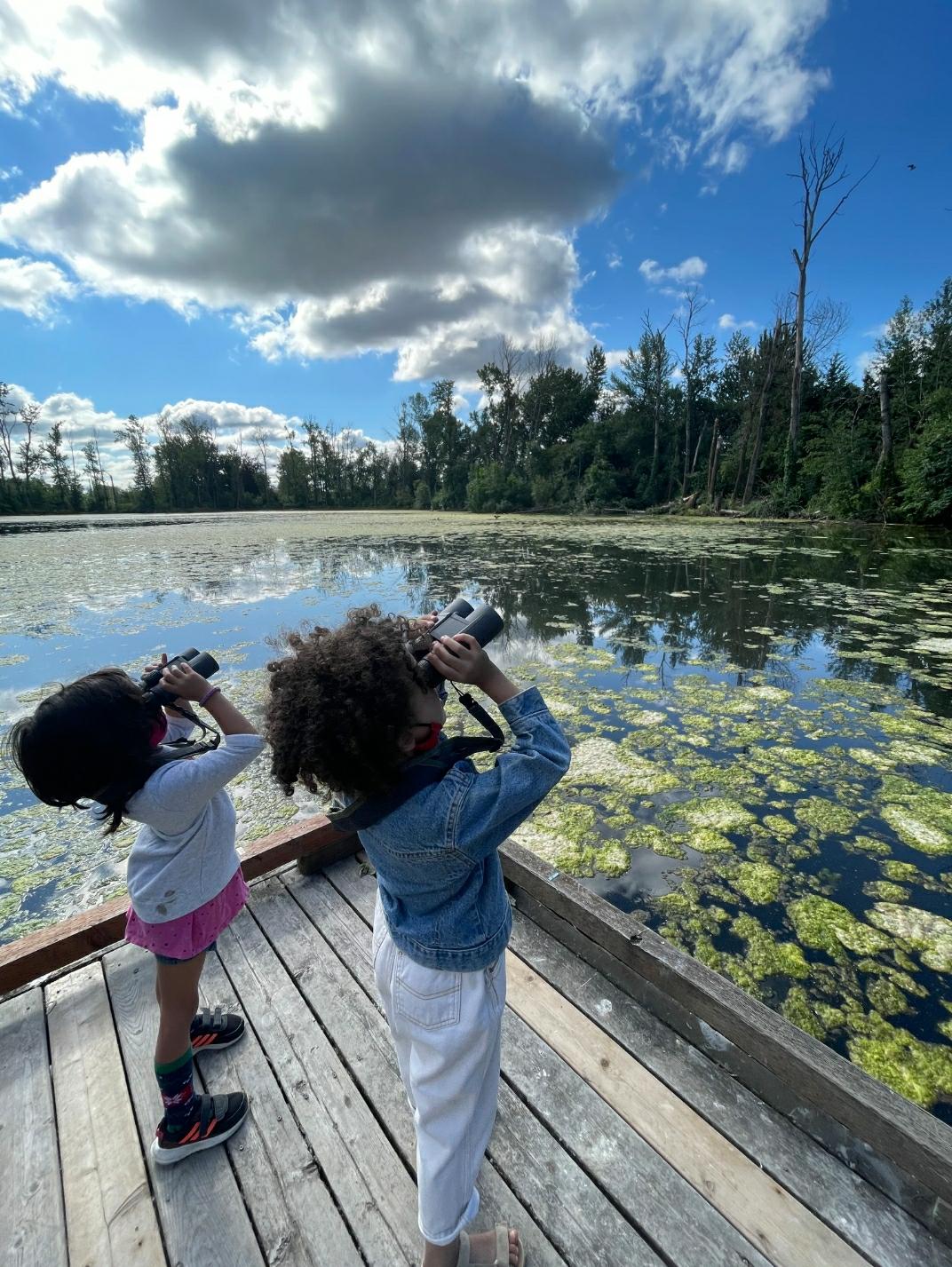
Just imagine, you’re walking in nature. You’re taking in the lush greenery, waterfalls and beauty when all of a sudden, a delusional and entitled person comes along to say and make you feel like you’re not welcome. As disheartening as this sounds, it’s happened to Pamela Slaughter, the founder of the hiking group, People of Color Outdoors (POCO), too many times to count. The “you don’t belong here” taunts she received while on the trails alone in her hometown of Portland, Oregon soon began to take a toll and she eventually retreated for some times from enjoying the nature she’d been exploring since she was a child. When she found out that she wasn’t alone in her experience, Slaughter couldn’t resist the call within her to do something about it.
“White people were pushing us out of nature spaces as if it all belonged to them,” she shared with Essence. “It was important for me to reclaim those spaces for us because I wanted to introduce people of color to the beauty Oregon had to offer despite its ugly past. So, I decided to create a safe space and build a community that could experience both peace of mind and enjoyment while out on the hiking trails together.”

Slaughter is just one of the 2.2 percent of African-Americans in the state known for its majestic waterfalls, rocky coastline and buzzing coffee scene, but there was a time when Black people weren’t allowed to live there at all — hence her mention of its “ugly past.”
In response to the urgent need for workers in the shipping industry during WWII, Slaughter’s family relocated to Oregon from Chicago. When the war was over, many Black migrants stayed, including her grandparents. And when the surrounding rivers reached well above flood level in 1948, officials decided not to issue warnings to the residents of Vanport, where the Black community lived. As a result, 18,500 people were displaced and hundreds died (though the full death toll has yet to be determined). Slaughter recalls with great pride, “My grandfather made the selfless decision to stay and help with the rescue efforts. After his trailer was emptied of its belongings by the flood, he dragged many people into it for safety.” Her grandfather saved many lives that dreadful day in American history. However, he could never unsee the lifeless bodies of those that he could not.
Despite that ordeal, her family would neither allow this brutal event to define their quality of life going forward nor let it blind them from the captivating allure of the land that surrounded them. “Growing up, I loved roaming the great outdoors with my family,” she says while reflecting on the fond memories. “Canoeing, trail running and bird watching were second nature to us and not even the racial slurs that were hurled our way could take away our joy. My family’s courage to keep going is what inspired me to return after I had my own negative experiences while out on the trails alone as an adult. And no longer having to go it alone was an absolute game changer.”
People of Colors Outdoors has gone from 700 members since its humble beginnings in 2017 to 3,200 members to date. Slaughter contributes that spurt in growth to simply meeting people where they are. “It’s no secret that most Black people have an aversion to so-called ‘white people stuff’ like rock climbing, camping and forest bathing,” she says. “What better way to show them how great some of these seemingly foreign activities can be than to combine them with something they are familiar with?”
“For example, we all love a good cookout, right? Well, once people show up, I then slowly introduce them to a whole new world; one that they have every right to experience,” she adds. “Because, when it comes to the outdoors, there is no ‘white people stuff.’ I mean, why are we even falling for that when they’re the ones that made that lie up?”

When People of Color Outdoors became a non-profit in 2020, it went from being just a hiking group for Blacks, the indigenous and people of color to becoming a haven of hope for so many people in need. From those who lost their jobs to parents struggling with homeschooling and individuals experiencing anxiety due to all that the pandemic and the wave of social injustices brought with it, POCO stepped up to the plate with a tremendous amount of compassion, support and resources. Its work locally has allowed it to be nominated for the first-ever Facebook Community Awards.
Clearly, some fresh air and exercise is not all you get when you decide to give POCO a try. Slaughter still gets teary-eyed when she talks about a letter she once received. “This person had pretty much made up their mind to pack their bags and leave Oregon for good because the racism was too much to bear,” she says. “They heard about POCO and decided to join. Next, they’re writing me a thank you letter because my group is where they ended up meeting their best friend. Do you believe that?! I was like, ‘Whoa! It doesn’t get better than this!’”
Slaughter’s organization has given a sense of belonging to so many of Portland’s locals and she wants its visitors to experience the same thing. “I am really excited about building a retreat center,” she says with the biggest smile. “I want it to be a hideaway where people of color can safely rest, refuel and recover from the woes of the outside world. And whether it’s for a quick staycay or a really long vacation, I want everyone to feel as though they’ve found a home away from home.” It’s her hope that one day in the future, Oregon will no longer be known for the way it treats people of color but instead, be a place filled with beauty that everyone is welcome to take in. Whatever comes though, she’ll keep reclaiming territory one footstep at a time.
